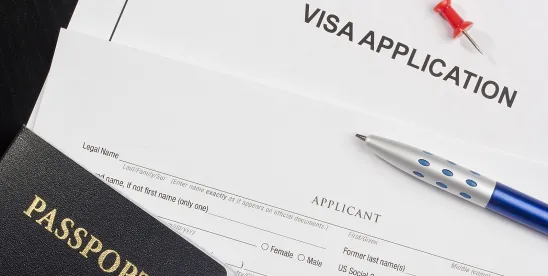The House of Representatives passed budget reconciliation bill H.R. 1, entitled “One Big Beautiful Bill Act,” that includes significant changes to the immigration fee structure. As the Senate prepares its version of the reconciliation bill, many of the immigration-related provisions are unchanged from the one passed by the House.
H.R. 1 aims to initiate or increase fees for many immigration-related applications, including the following:
- $1,000 asylum application fee;
- $1,000 fee for individuals paroled into the U.S.;
- $500 application fee for Temporary Protected Status (TPS);
- $250 visa integrity fee;
- $100 annual fee while asylum applications remain pending;
- $1,500 fee to adjust status to lawful permanent resident (green card);
- $1,050 fee for inadmissibility waivers;
- $900 fee to file motions to reopen or reconsider; and
- $30 fee for Form I-94 (arrival/departure record).
The proposed fees would increase annually, and fee waivers will not be granted under the bill. Additionally, employment authorization document (EAD) renewals for categories including TPS, asylum, and humanitarian parole would be required every six months, with a $550 fee per renewal. Further, the Trump Administration reportedly plans to introduce a $1,000 fee for expedited processing of tourist and nonimmigrant visa applications on top of the normal $185 processing fee.
The bill also allocates over $60 billion to U.S. Customs and Border Protection through 2029, quadrupling CBP’s annual budget to expand facilities, hire thousands of new agents, and deploy advanced surveillance and biometric technologies. Although aimed at enhancing border security, an expanded use of AI and biometric systems may increase scrutiny and delays for legal immigrants, including visa holders and lawful permanent residents (LPR), at ports of entry.
The bill authorizes approximately $146.3 billion in funding for immigration detention and enforcement activities. It also reduces funding for Social Security, Medicare, and other public programs. Employees on visas or with LPR status could face new financial and eligibility constraints as a result. A 3.5% remittance tax would apply to money sent abroad by non-citizens, directly affecting workers supporting family overseas. Similarly, eligibility for healthcare premium tax credits and Medicare would be limited to a narrow group (excluding most temporary workers, including H-1B visa holders), potentially increasing out-of-pocket healthcare costs for both employees and sponsoring employers.




 />i
/>i

